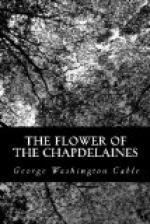Her black cupid was at her side, tiny even for nine years. They disappeared conversing together. With his heart in his throat Chester turned away, resumed his walk, and passed into the marble halls where justice dreamt she dwelt. Up and down one of these, little traversed so early, he paced, with a question burning in his breast, which every new sigh of mortification fanned hotter: Had she seen him?—this time? those other times? And did those Castanados suspect? Was that why Mme. Castanado had the grippe, and the manuscript was yet unread?
A voice spoke his name and he found himself facing the very black dealer in second-hand books.
“I was yonder at Toulouse Street,” said Ovide Landry, “coming up-town, when I saw you at Conti coming down. I have another map of the old city for you. At that rate, Mr. Chester, you’ll soon have as good a collection as the best.”
The young man was pleased: “Does it show exactly where Maspero’s Exchange stood?” he asked.
Ovide said come to the shop and see.
“I will, to-day; at six.” Another man came up, “Ah, Mr. Castanado! How—how is your patient?”
“Madame”—the costumer smiled happily—“is once more well. I was looking for you. You didn’t pass in Royal Street this morning.”
[Ah, those eyes behind those windows behind those balconies!]
“No, I—oh! going, Landry? Good day. No, Mr. Castanado, I——”
“Madame hopes Mr. Chezter can at last, this evening, come at home for that reading.”
“Mr. Castanado, I can’t! I’m mighty sorry! My whole evening’s engaged. So is to-morrow’s. May I come the next evening after? . . . Thank you. . . . Yes, at seven. Just the three of us, of course? Yes.”
III
Six o’clock found Chester in Ovide’s bookshop.
Had its shelves borne law-books, or had he not needed for law-books all he dared spend, he might have known the surprisingly informed and refined shopman better. Ovide had long been a celebrity. Lately a brief summary of his career had appeared incidentally in a book, a book chiefly about others, white people. “You can’t write a Southern book and keep us out,” Ovide himself explained.
Even as it was, Chester had allowed himself that odd freedom with Landry which Southerners feel safe in under the plate armor of their race distinctions. Receiving his map he asked, as he looked along a shelf or two: “Have you that book that tells of you—as a slave? your master letting you educate yourself; your once refusing your freedom, and your being private secretary to two or three black lieutenant-governors?”
“I had a copy,” Landry said, “but I’ve sold it. Where did you hear of it? From Rene Ducatel, in his antique-shop, whose folks ’tis mostly about?”
“Yes. An antique himself, in spirit, eh? Yet modern enough to praise you highly.”




